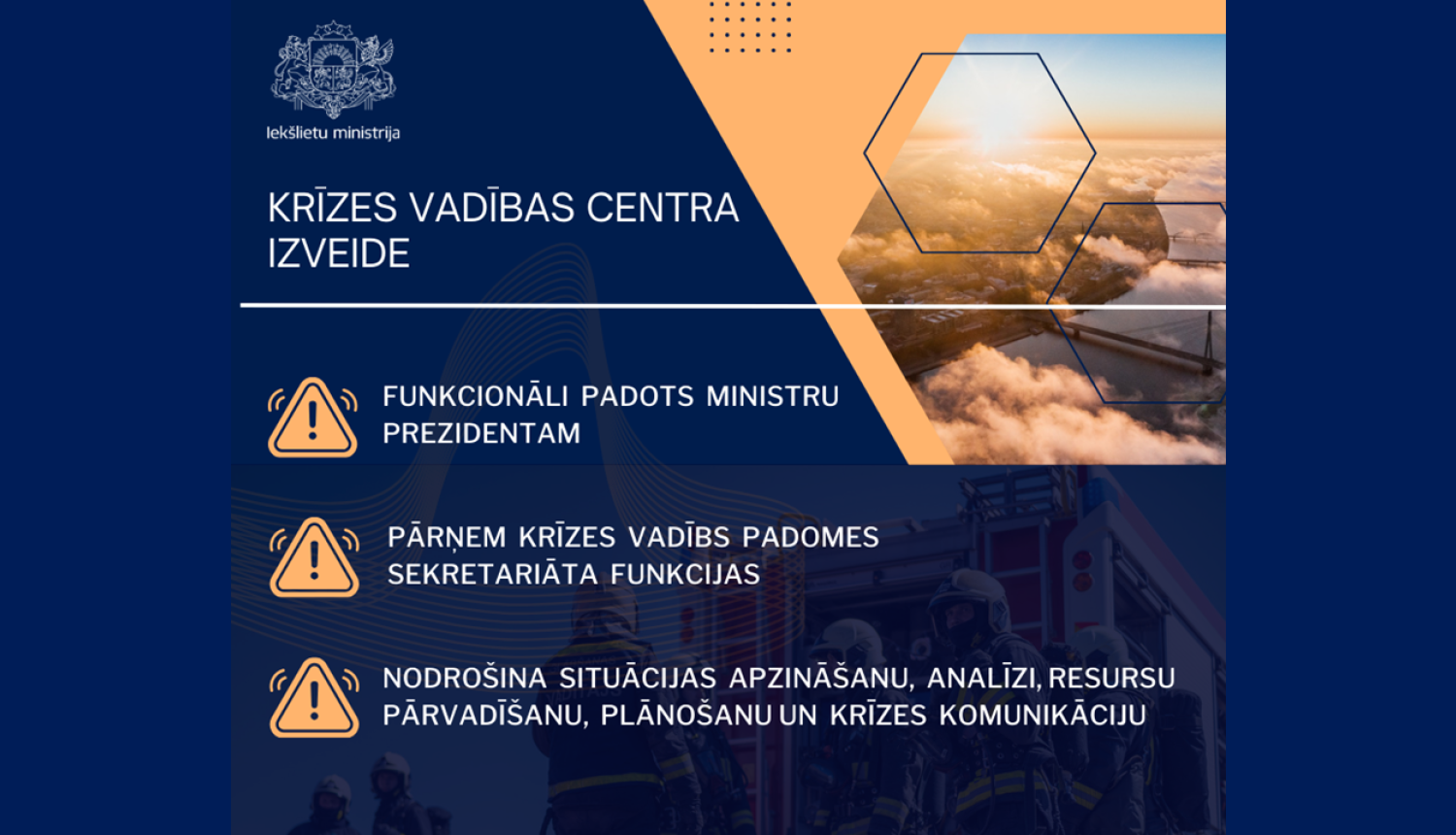On Tuesday, 20 February, the Cabinet of Ministers (CoM) took note of the information report of the Ministry of the Interior on “Crisis Management Centre and Crisis Management System” and supported the solution proposed in the information report to ensure centralized and rapid decision-making in the future, coordinating the work of the involved state and local government institutions and ensuring public information.
The restructuring of the Crisis Management Council and the establishment of a Crisis Management Centre (CMC), defining its competences, functions and tasks. This requires a review of the composition and organisation of the Crisis Management Council. In order to take decisions quickly and efficiently in the event of a civil crisis, the composition of the Crisis Management Council should be extended to include all ministers.
To provide permanent support to the Crisis Management Council, ministries and local authorities, it is planned to establish the CMC under the direct authority of the Prime Minister/Crisis Management Council Chairperson. It would be part of the State Chancellery, but functionally subordinate to the Prime Minister. The secretariat of the Crisis Management Council would be provided by the CMC. The Crisis Management Council would take decisions at the strategic level and the CMC – at the operational level. The CMC would not take over the functions of the crisis management bodies (councils, centres, commissions, etc.) already established in the line ministries, but would take the lead in coordinating the activities of these bodies in the event of a cross-sectoral crisis.
The CMC will ensure the implementation of five main functions:
• monitoring the situation and gathering information, and identifying risks and threats;
• analysis – processing information and data, and identifying and assessing risks and threats;
• strategic planning and coordination of operational planning;
• coordination of planning, logistics and recovery of State-level civilian crisis management resources, including State material reserves;
• coordination of crisis communication.
The competences, functions and tasks of the CMC in its day-to-day work would be to identify, analyse and forecast hazards, vulnerabilities and resilience; to ensure information flow; to identify and plan resources to cope with hazards; to provide methodological support to ministries and municipalities in assessing risks and identifying necessary measures to cope with hazards in their area of responsibility.
In the event of a civil crisis, in addition to its day-to-day work, the competences, functions and tasks of the CMC would include the preparation of draft decisions for approval by the Government to manage a crisis or disaster; the management and coordination of multi-sectoral or country-wide hazard management; the coordination of civil-military cooperation; and the coordination of the activities of the CMC sub-groups.
In the event of a military crisis, the CMC will coordinate the civilian sector and ensure cooperation with the military sector.
It is also foreseen that ministries, subordinate institutions, local governments, scientific institutions and non-governmental organizations may be involved in the work of the CMC sub-groups, if necessary.
The CMC should also ensure coordination in EU crisis management formats in order to ensure interaction with all ministries and an overall common vision on civilian crisis management issues at both State and EU level.
The State Chancellery, in cooperation with the Ministry of the Interior, is instructed to prepare and submit to the CoM for consideration by 30 April 2024 an information report with proposals on the structure, physical location, personnel and material and technical support required for the Crisis Management Centre to fulfil its tasks.
The State Chancellery, in cooperation with the Ministry of the Interior, is also to prepare and submit to the CoM, by 30 June 2024, the necessary draft legislation for the establishment and operation of the Crisis Management Centre and for the reorganization of the crisis management system.
The CoM also noted that the State Chancellery needs three new posts until 31 December 2024 to ensure the necessary work for the start-up and operation of the Crisis Management Centre and the reorganization of the crisis management system.
The information report has been prepared in order to implement the Government Action Plan on the establishment of a Crisis Management Centre for crisis management.
Currently, in Latvia, under the National Security Law, in the event of a national threat, the coordination of civil-military cooperation and operational measures of state administration institutions to deal with a national threat is ensured by the Crisis Management Council. The Crisis Management Council is chaired by the Prime Minister. The members of the Crisis Management Council are the Minister of Defence, the Minister of Foreign Affairs, the Minister of Economy, the Minister of Finance, the Minister of the Interior, the Minister of Justice, the Minister of Health, the Minister of Transport and the Minister of Environmental Protection and Regional Development, but it does not include the Minister of Education and Science, the Minister of Culture, the Minister of Welfare, the Minister of Agriculture, the Minister of Climate and Energy.
Prepared by:
Ministry of the Interior
Communication Department



